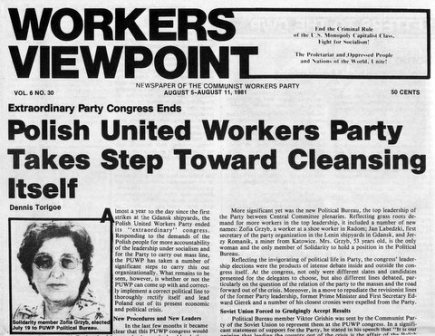
First Published: Workers Viewpoint, Vol. 6, No. 30, August 5-11, 1981.
Transcription, Editing and Markup: Paul Saba
Copyright: This work is in the Public Domain under the Creative Commons Common Deed. You can freely copy, distribute and display this work; as well as make derivative and commercial works. Please credit the Encyclopedia of Anti-Revisionism On-Line as your source, include the url to this work, and note any of the transcribers, editors & proofreaders above.
Almost a year to the day since the first strikes at the Gdansk shipyards, the Polish United Workers Party ended its “extraordinary” congress. Responding to the demands of the Polish people for more accountability of the leadership under socialism and for the Party to carry out mass line, the PUWP has taken a number of significant steps to carry this out organizationally. What remains to be seen, however, is whether or not the PUWP can come up with and correctly implement a correct political line to thoroughly rectify itself and lead Poland out of its present economic and political crisis.
In the last few months it became clear that this PUWP congress would not be business as usual. During the delegate selection at the local level, there was intense two-line struggle over who to send. In a number of areas, leadership connected with the old Gierek clique was overturned, and new delegates–many of them rank and file workers–elected. A fact that gives lie to the line that Solidarity is “anti-communist” is that 20 per cent of the 1,955 PUWP delegates were members of the independent union, according to official Polish sources.
The delegates at the congress showed themselves to be both critical of political maneuvers and at the same politically mature. At the beginning of the congress, First Secretary Kania tried to pull a fast one on the delegates. His attempt to hold the election for first secretary at the beginning of the congress was beat back by the delegates. Instead, they voted for the 200 member Central Committee first, and then voted by secret ballot for the top party position.
Kania and Prime Minister General Jarzelski both won by big margins in the Central Committee elections. Prominent losers were those tied to the old Gierek clique and those who held strong views against Solidarity and against the Party itself. These included Tadeusz Grabski, a hard-liner who opposed Solidarity, and Mieczyslaw Moczar, a general who also opposed the union and was widely rumored to be anti-semitic. Tadeusz Fiszbach, the party leader of Gdansk who called for a revisionist “federationism” of the Party, was also defeated.
More significant yet was the new Political Bureau, the top leadership of the Party between Central Committee plenaries. Reflecting grass roots demand for more workers in the top leadership, it included a number of new names: Zofia Grzyb, a worker at a shoe worker in Radom; Jan Labedzki, first secretary of the party organization in the Lenin shipyards in Gdansk, and Jerzy Romanik, a miner from Katowice. Mrs. Grzyb, 53 years old, is the only woman and the only member of Solidarity to hold a position in the Political Bureau.
Reflecting the invigorating of political life in Party, the congress’ leadership elections were the products of intense debate inside and outside the congress itself. At the congress, not only were different slates and candidates presented for the delegates to choose, but also different lines debated, particularly on the question of the relation of the party to the masses and the road forward out of the crisis. Moreover, in a move to repudiate the revisionist lines of the former Party leadership, former Prime Minister and First Secretary Edward Gierek and a number of his closest cronies were expelled from the Party.
Political Bureau member Viktor Grishin was sent by the Communist Party of the Soviet Union to represent them at the PUWP congress. In a significant statement of support for the Party, he stated in his speech that “It is our opinion that leading the country out of the crisis is the affair of the Polish Communists themselves...” Its significance lies in the fact that the Soviet Union has the line of “limited sovereignty,” which they say gives them the right to intervene “wherever socialism is threatened.” Grishin’s statement is thus an indication that the Soviet Union has decided not to intervene militarily at this point. At the same time, it has not repudiated its incorrect line. Grishin also stated that the Soviet Union would not be “indifferent” if Polish communism were threatened by “anti-socialist elements.”
Though a significant step, the PUWP congress still represents only a first step in the rectification process. As CWP’s General Secretary Jerry Tung has stated in his book The Socialist Road, while organizational measures are necessary to clothe and implement a correct line to ensure democracy for the masses under workers’ rule, there are not organizational guarantees for a correct line. You need an able cadre core representing the best sons and daughters of the masses, the most farsighted and dedicated. Especially now, when the PUWP faces yet the question of resolving the intense economic crisis upon them, the quality of the cadre core is decisive in implementing its program. With the bold steps taken at its congress, however, socialism has a better chance than ever to bloom in Poland.